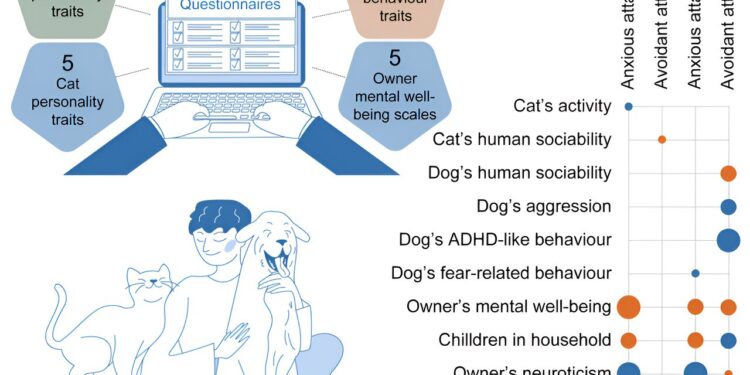Credit: iScience (2023). DOI: 10.1016/j.isci.2023.108423
Researchers at the University of Helsinki collected data on the personality traits of thousands of dogs, cats and their owners to explore owner-pet attachment. The data covers approximately 2,500 pet owners and 3,300 pets. The work is published in the journal iScience.
Human-pet relationships, like those between humans, can be described by examining two dimensions of insecure attachment: anxious and avoidant. Individual differences can be observed between these two attachment styles in terms of their respective needs for closeness and independence. An anxious pet owner has an increased need for closeness and fears losing their pet. In contrast, an avoidantly attached pet owner craves a high degree of independence and fears the loss of personal autonomy.
In addition to studying the role of owner personality in attachment style, this was the first time researchers considered the personality traits of attachment objects, i.e., pets . The importance of mental well-being has been examined for both owners and pets. For the first, researchers looked at symptoms of anxiety and depression, stress and life satisfaction. The mental well-being of cats and dogs has been studied by exploring undesirable behavioral traits, which reflect phenomena similar to human mental well-being problems.
Mental well-being of both parties visible in the type of attachment bond
The study found that cat and dog owners with lower mental well-being scores were more attached to their pets. Among dog owners, these scores were also associated with an avoidant attachment style. The dogs’ poor “mental well-being”, that is, undesirable behavior, was associated with both attachment styles: aggressive and ADHD-like behavior with avoidantly attached owners, and aggressive and ADHD-like behavior with avoidantly attached owners, and fear with anxious owners.
“Owners who attach in an avoidant manner may not provide sufficient security for their dog in threatening situations, which can cause fear and aggressive behavior,” explains doctoral student Aada Ståhl. These owners may also participate in fewer shared activities with their dog, which is in turn associated with impulsivity in dogs. Furthermore, it is possible that the direction of causality is reversed, that is, undesirable behavior in a dog may contribute to insecure attachment, increasing the owner’s need for independence or closeness.
Dog and cat personality plays a role in insecure attachment
Personality traits of cat and dog owners and their pets were associated with these two insecure attachment styles. Owner neuroticism, in particular, was associated with an anxious attachment style.
“The personality trait of neuroticism is characterized by instability in the expression of emotions, reflecting insecurity, anxiety, and threat detection. This may explain this association, given that attachment anxiety reflects a sensitivity to the experience of negative emotions in the context of the relationship”, emphasizes Ståhl.
Additionally, more active cat owners and, on the other hand, more conscientious cat owners were more anxious. Among dog owners, those who were more neurotic, agreeable, and extroverted were less avoidantly attached to their dogs. In general, more sociable dogs and cats had fewer avoidant owners.
“In other words, the animal’s tendency to seek proximity and interaction in a relationship was associated with a similar tendency in the owner,” notes Ståhl.
A better understanding of the relationship between pet and owner helps promote the well-being of both
The bond of attachment between owner and animal significantly impacts the life they share. Previous research has shown, for example, that attachment style affects the type of care an owner provides to their pet.
“What made this project unique is that it involved dogs, cats and owners. We need a deeper understanding of the connections between owners and pets and the associated factors in order to to be able, for example, to help people make better decisions when acquiring a pet. It is important to recognize that obtaining a pet while experiencing poor mental well-being does not necessarily meet expectations in terms of improvement.
“On the other hand, the results suggest that interventions targeting problematic dog behaviors could be beneficial if the focus was not only on changing the animals’ behavior, but also on addressing style-related factors. of attachment of the owner”, explains Professor Hannes Lohi.
More information:
Aada Ståhl et al, Pet and owner personality and mental well-being are associated with attachment to cats and dogs, iScience (2023). DOI: 10.1016/j.isci.2023.108423
Provided by the University of Helsinki
Quote: Owner personality and mental well-being associated with human-animal attachment (November 27, 2023) retrieved November 28, 2023 from
This document is subject to copyright. Except for fair use for private study or research purposes, no part may be reproduced without written permission. The content is provided for information only.



